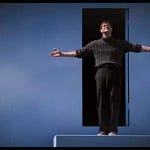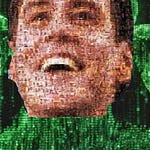I don’t think Morgue adequately explored the distinction between the truman-atrix (one player simulated reality) and the truman-atrix-plus (multi-player simulated reality). He only briefly mentions that our dreaming state while asleep at night is like our individual reality (ie truman-atrix) and our dreaming state while awake during the day is like creating our shared reality (sort of like the truman-atrix-plus but not quite).
Nonetheless, Morgue provides a good introductory video to the various concepts regarding the simulation hypothesis, and the associated quantum physics ideas. It might be a bit heavy for some.
Morgue mentioned metaphysical reality is a mathematical mental reality based on immaterial frequencies, so our reality is:
dreamlike because it’s mind (immaterial mental frequencies)
code-like because it’s structured through eternal mathematical law, which is code-like
holographic because these frequencies form an interference pattern that project the dimensional dream reality that we inhabit together
So, the various analogies to simulation theory/simulation reality contain ALL the analogies, as they are all valid: dream, hologram, code directing the hologram projections. Could there be truth to the below video that our earth is a type of motherboard that powers our holographic illusory world, and perhaps that is why so many people are entranced by the system and can’t see & understand WTF on Earth is Happening?
Incredibly, many around the world STILL have no idea WTF on Earth is Happening, so perhaps this post below can help educate. In addition to Reiner Fuellmich below, here in Canada, there are many Covid political prisoners & persecutions too: Tamara Lich, and Art Pawloski, and the Coutts three, etc…
However, I still say Covid is one small symptom of a much bigger disease, that my site tries to expose. Nonetheless, I hope this information might inspire people to do their own research, which is the only way anybody can be convinced personally.
Anyway, back to Morgue’s video. :-) I thought the Rubik’s cube analogy about how zero is a structure of positive and negative values was interesting. So, the cube can recombine into many different realities/combinations, while maintaining zero, which is nothingness, which cannot be created or destroyed, like energy itself, so it is eternal, as are we. We are the Absolute! I AM! I AM the absolute, and YOU ARE the absolute, together making the WE ARE the absolute, networked nodal minds.
As Morgue says, the bedrock of reality then is based on ZERO, an immaterial existence that has eternal existence that is a structure of nothingness that is exploring all the different patterns that it can take on while maintaining being nothing.
As a former programmer, I know it would be extremely difficult to create a complex program AND ALSO make sure the sum of every underlying bit adds up to zero. All computer operations boil down to binary digits of 0 or 1, which represent the on or off state of allowing electricity to flow through a transistor, a tiny physical device that acts like a digital switch in computers. The transistor turns on when enough electricity flows through and stays off otherwise. The microchips in our computers contain billions of these tiny on-off transistor switches.
An aside:
There is a common idea these days that so-called “5D” reality is sort of like the ideal heavenly realm that we want to go to when we die. I think that would entail dangers. 1 = true in the digital computer system, and 0 = false, as all computer code reduces down to zeros and ones.
No computer we know of has base 10 code (unless they have quantum computers already that can somehow access computation beyond the base 2 numbering system called binary). It is only 0 or 1, aka base 2 binary number coding. Not 0,1,2,3,4,5,6,7,8,9, which would be base 10 coding, which would be exponentially complex computer code that I suspect only the Originator-Creator-Oversoul could possibly understand.
I used to program computers and binary code is difficult enough to make right, as proven by the many bugs that ALL computer programs have and programmers have to be constantly fixing the bugs. Base 10 would be beyond even supposedly artificial intelligence large language models to make work.
If Morgue is correct in the above video that, “the bedrock of reality then is based on ZERO, an immaterial existence that has eternal existence that is a structure of nothingness that is exploring all the different patterns that it can take on while maintaining being nothing”, then maybe ONE is the only other state we should desire or think about.
In our inverted world, computers code bit 0 = false and bit 1 = true, but in true reality, based on ZERO (according to Morgue), bit 0 = true and bit 1 = false, because a reality based on ZERO is the true dimension we come from (ie we project from ZERO — the true dimension — INTO this digital simulated reality which requires ONE — the false dimension). Perhaps being in 1D eventually leads to 2D, 3D, 4D, etc... and get trapped into deeper layers of this false reality, as I believe in the soul trick theory, that we were likely tricked and/or forced into coming here in the first place (perhaps we made the choice naively due to lack of knowledge/experience as some Gnostics claim similarly for Sophia…many possibilities).
I rather think we should think in terms of 0D (0 dimension), instead of going to so-called 5D that people think is the thing. Even so-called 1D, which I call 1DD (1 dimensional depth) would encase dangers too, would it not?
If ZERO dimension is the prime reality of:
unconditional love
100% positive thoughts/emotions
100% positive intentions/motivations about everything/everybody
100% total knowledge of all things, and a non-duality existence
THEN it follows that the ONE dimension is any derivative reality that contains:
conditional love
percentage combinations of positive & negative thoughts/emotions (eg a psyche with 80% negative thoughts and 20% positive thoughts combined with 90% negative emotions and 10% positive emotions)
percentage combinations of positive & negative intentions/motivations about everything/everybody (eg a psychopath might have 99% negative intentions motivating him to deceive somebody and only 1% positive intentions, in his mind, thinking he might be doing some “good”)
partial knowledge about things, and a duality existence
I don't think we want 5D, which I call 5DDD (dimensional depths of deception), but rather 0D and 1DD only. Because 1DD can lead to 2DDD, 3DDD, 4DDD, 5DDD, etc… and you risk your consciousness falling into infinity dimensional depths of deception (ie the limbo concept from the movie “Inception”).
Perhaps that is why the matrix is breaking down, and there are glitches everywhere like Mandela effect, etc.... The more who wake up, the more the AI-Demiurge can't track and fix critical bugs. Full true freedom can only come if all divine sparks move to 0D (true unity, as the number 8 is a symbolic looping infinity containing two ZEROS — 8 bits makes a byte, in the computer world, and the "byte" will bite you in the rear and loop you back for another reincarnation, perhaps forever in limbo).
The entire AI-Demiurge-matrix system can be destroyed, with the correct knowledge. The traditional ideas of 1D and 2D also implies -1D and -2D, etc... encapsulating the black hole/white hole trap, that some have postulated we exist in.
So, really, staying in 0D negates all that, because there is no -0D ... just food for thought. Detachment & disassociating, while maintaining empathy without fear, sounds right to me. Not even need 1DD, as in one "dimensional depth" is necessarily “good”, but I think it is the farthest that Originator-Creator-Oversoul ever wanted his creation(s) to venture.
End of aside
As for Morgue’s idea of the zeros and ones balancing out, in general, most computer programs don't necessarily "average" to zero in the sum of their bits. However, there are some interesting patterns and exceptions to consider:
Random bit patterns: In many cases, the bits in a computer program are randomly distributed, and the sum of these bits can be expected to converge to zero as the number of bits increases. This is because each bit has a 50% chance of being either 0 or 1, and the law of large numbers suggests that the average will approach zero as the number of trials (in this case, bits) increases.
Binary representations: When representing numbers using binary (base-2), many numbers have a natural tendency to be close to zero due to the way binary arithmetic works. For example, the average value of a set of random binary numbers is often close to zero because many numbers have an even number of 1s, which cancel out when added.
Program-specific behavior: Some programs may exhibit patterns that lead to an average value close to zero. For instance, if a program is designed to perform calculations that involve many small values, the sum of these values might be close to zero. However, this is not a general property of all computer programs.
Exceptions: There are some notable exceptions where the sum of bits in a program might not average to zero:
a. Cryptographic algorithms: In some cryptographic applications, such as hash functions or encryption algorithms, the goal is to produce a non-zero output that is difficult to predict or manipulate. In these cases, the sum of bits may not average to zero.
b. Program-specific properties: Certain programs may have specific properties or constraints that lead to an average value that is not zero. For example, some algorithms rely on the properties of prime numbers or other mathematical structures that don't necessarily average to zero.
c. Bugs or anomalies: In rare cases, a program may contain bugs or anomalies that cause the sum of bits to deviate significantly from zero.
In summary, while many computer programs may exhibit an average value close to zero due to random bit patterns or binary representations, this is not a universal property of all programs. The behavior of a program's bits depends on its specific design, implementation, and purpose.
I know the extremely complicated code that must be running our reality would be complex enough to require a super-intelligence to make sure the sum of every bit balances out to exactly zero.











